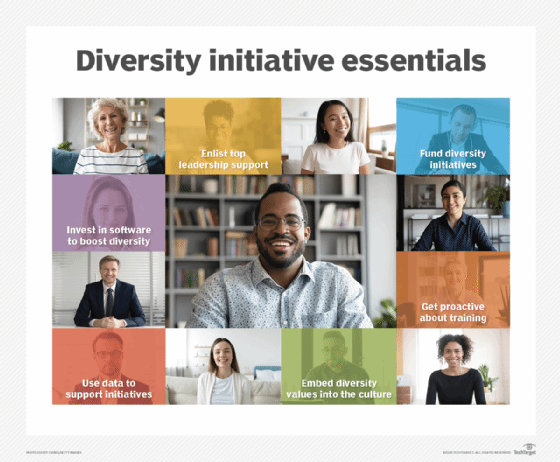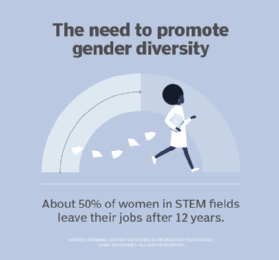What is DEI? Understanding Diversity, Equity and Inclusion in HR
Diversity, equity and inclusion (DEI) is the practice of creating fair, respectful and inclusive workplaces by valuing differences, addressing bias and ensuring equal opportunities for all employees. DEI efforts focus on improving representation, fostering belonging and aligning organizational policies with principles of fairness and respect.
Diversity, equity and inclusion are three different but interconnected concepts. They work together to create an environment of respect and fairness. It involves initiatives promoting the equal access, opportunity, employment and sense of belonging of underrepresented people in the workplace.
DEI plays an important part in promoting an inclusive workplace culture and ensuring an effective recruiting and hiring process. It aims to achieve these goals by overcoming unconscious biases, which are stereotypes about other people formed outside a person's awareness, and identifying and mitigating microaggressions, which are negative behaviors toward individuals based on those biases.
What is diversity?
Diversity involves all the ways that people are different, including the various characteristics that distinguish one demographic or individual from another. Diversity often refers to including demographics that aren't broadly represented in society or certain industries.
This article is part of
ESG strategy and management guide for businesses
Elements of diversity include the following:
- Race.
- Ethnicity.
- Sexual orientation.
- Socioeconomic status.
- Gender identity.
- Religion.
- Language.
- Age.
- Marital status.
- Veteran status.
- Mental ability.
- Physical abilities and disabilities.
Diversity also includes the range of ideas, perspectives and values people have.

What is equity?
Equity aims to ensure equal treatment, access, opportunity and advancement for people, including employees in the workplace. Equity attempts to identify and remove barriers that prevent some groups from fully participating in society or certain jobs and industries.
To promote equity, people often focus on understanding the causes that underlie disparities in society. The aim of equity is to promote justice, fairness and impartiality in the way things are done and in the distribution of resources within social structures, systems and institutions. Equity efforts exist in the workplace, the justice system, schools and other institutions.
What is inclusion?
Inclusion builds a culture where everyone feels welcome. It actively invites every person and group to contribute and participate. An inclusive, welcoming environment supports and embraces differences. Participants offer respect to everyone in words and actions.
A work environment that's inclusive is supportive, respectful and collaborative, and encourages all employees to participate and contribute. Organizations with inclusive work environments should eliminate barriers, discrimination and intolerance, and aim to build a workplace in which employees feel they belong and are supported by equitable procedures and socially aware human resources (HR) departments.
Why is diversity, equity and inclusion important?
Diversity, equity and inclusion are three interconnected concepts that work together to promote healthy communities and places of work free of stereotyping and mistreatment. There are several reasons DEI is important:
DEI is the right thing to do
DEI-based efforts help build a fair society that gives everyone equal opportunities. The moral case for DEI is that everyone has something of value to contribute to organizations and society. Society and organizations must address barriers and historical factors that cause or create unfair conditions for underrepresented groups. In doing so, DEI awareness can help underrepresented people and groups be more equally represented and reach higher socioeconomic standing.
It's good for productivity
DEI is good for businesses and their work culture. It brings together different people, perspectives and ideas to create stronger organizations and bonds among employees. Companies that seek out diverse candidates and engage in diversity training generally outperform less DEI-focused companies and operate more efficiently, according to McKinsey & Company research from 2020. Without diversity, organizations fail to embrace new perspectives and end up less competitive compared with companies that embrace diversity. A culture of equity and inclusion makes it less likely that employees will feel underrepresented and take their talents elsewhere.
It's good for brands
DEI is part of organizations' environmental, social and governance (ESG) policies, a popular business strategy that lets organizations demonstrate how seriously they take social issues. Customers, employees, shareholders and other stakeholders are increasingly concerned about ESG and DEI practices in the businesses they work for and deal with, making a DEI strategy good for a business's brand and reputation.
How do diversity, equity and inclusion each apply to the workplace?
Although diversity, equity and inclusion are closely connected, they are separate concepts that represent three parts of DEI.
Diversity is acknowledging that people aren't sets of specific characteristics and that each voice is unique. Real diversity requires a deeper understanding of each person as an individual rather than a stereotype. Diversity also refers to the makeup of a workforce as it relates to specific characteristics including race, gender, sexual orientation, culture and experience. At its core, it's about welcoming different perspectives and backgrounds to a business and actively seeking them out.
Equity refers to the promotion of impartiality in an organization's procedures toward its diverse workforce. This includes policies that pertain to areas such as talent acquisition, hiring and raises. Companies that adopt equity practices don't establish one-size-fits-all policies. Instead, they take individual needs into consideration, while also readjusting organizational structures to account for the disadvantages and inequities minority groups face.
Inclusion refers to giving each worker room to flourish and succeed in a work environment. It is about giving all employees the opportunity to voice their opinions and ensuring they aren't excluded based on their identities. It's also about enabling employees to see themselves reflected in their organizations' values.
For more on ESG strategy and management, read the following articles:
Sustainability and ESG glossary: 52 terms to know
5 ways organizations can address the social factors of ESG
A timeline and history of ESG investing, rules and practices
ESG materiality assessments: What CIOs, others need to know
ESG vs. CSR vs. sustainability: What's the difference?
ESG metrics: Tips and examples for measuring ESG performance
Challenges of employee underrepresentation
Employee underrepresentation presents several challenges:
- Nondiverse talent pools. Talent pipelines are not always diverse. This lack of diversity is more pronounced in certain industries, educational institutions and training programs from which an organization recruits. As a result, organizations can struggle to secure diverse candidates in industries that don't already have a history of diversity or are not producing diverse talent.
- Hiring biases. Hiring issues such as unconscious biases and biased job descriptions and interview questions can prevent qualified diverse candidates from landing a job. In particular, talent acquisition programs that fail to reach out to underrepresented communities can end up being biased. If a company only performs outreach in the same few locations, it will limit its diversity. Some artificial intelligence programs designed to incorporate DEI have also been found to have biases.
- Retention and advancement. Organizations that do not offer adequate mentoring, support and opportunities for advancement can struggle to retain underrepresented employees and promote them into positions of power and importance.
Benefits of DEI initiatives for organizations
Companies with DEI policies are often more creative and innovative than companies that lack the initiative. They employ people with different experiences, backgrounds and skills who bring new ideas and points of view to discussions and decision-making. According to McKinsey and other research groups, DEI has a positive effect on an organization's bottom line.

In addition, employees at companies with strong DEI programs are happier in their jobs, trust management more and perform better. According to Ania Krasniewska, group vice president at Gartner, "Belonging is a key component of inclusion. When employees are truly included, they perceive that the organization cares for them as individuals. ... It's good for employees -- and ultimately improves business performance."
How to implement DEI in the workplace
For DEI initiatives to be successful, everyone must take responsibility for building an inclusive corporate culture. That means implementing top-down, companywide strategies and programs to address and prevent workplace bias and promote inclusivity, recognition, respect and appreciation.
Here are some ways to approach implementing DEI in the workplace:
- Hire a chief diversity officer (CDO). CDOs start diversity initiatives to attract and retain diverse employees, improve the culture of the organization, support employee resource groups and create a more inclusive work environment.
- Create a transformation committee of people passionate about building a more diverse, equitable and inclusive organization. This group works with the CDO and other leaders to develop action plans to meet the organization's DEI strategy objectives. It is a best practice to form a diverse transformation committee.
- Ensure the DEI goals are concrete, actionable and quantifiable.
- Identify workers who want to act as DEI sponsors. Younger workers often say DEI is an important factor in deciding where to work, according to research by Glassdoor. Given that, it's important to engage younger employees in DEI initiatives. It's also important to strike a balance between senior and junior workers who can help encourage a culture of diversity, equity and inclusion within the company. Making sure to include people of color and their perspectives is important as well.
- Talk to employees about why DEI matters. Companies need diverse leaders who emphasize the importance of DEI in the workplace.
- Ensure DEI is integrated into the larger business strategy and culture of the organization, including the HR group.
- Develop sponsorship programs to provide opportunity and growth to minorities and marginalized groups.
- Communicate expectations to managers and hold them accountable for results. Increasingly, employees have expectations about their organization's DEI initiatives. It's up to senior management to communicate those expectations throughout the organization and participate in making the program successful.
- Commission an annual DEI report listing the work the company has done and the progress made toward meeting its goals and objectives. In addition, use metrics to track data on diversity throughout the organization, including recruiting practices and retention.
DEI in talent acquisition
Talent acquisition is an important element of DEI. To acquire top talent through DEI, organizations should take the following steps:
Diversify candidate pools. Recruit from diverse areas and partner with organizations that support the training and inclusion of different types of people in workforces. Companies can create their own mentoring programs that connect with underrepresented people and guide them through their education and careers.
Use inclusive hiring practices. Blind resumes -- which obscure candidate details that could indicate socioeconomic status, race or other personal details -- and inclusive job postings feed into DEI objectives.
Provide training for employees. Help them understand the value of DEI and the dangers of unconscious bias and microaggressions in hiring and working together.
Track progress. Regularly analyze and report on the success of DEI talent acquisition initiatives. This is an opportunity to check how a company is performing and work on areas of weakness.
Build an inclusive workplace. Top talent is often attracted to companies with inclusive environments that already have support for diverse groups of people.
DEI is important to building a welcoming workplace and attracting top talent. Find out how a data-driven approach to DEI supports real diversity in the workplace.
Changing letter order to “IDE”
There have been discussions about changing the letter order of DEI to “IDE” or “EDI” to put the words “inclusion” or “equity” first in the initialism. The emphasis on diversity first is considered a more outward approach that works on recruiting employees of various races, genders, viewpoints and sexuality. However, this can be construed as a quick fix for a bigger problem if the company does not put the most focus on equity or inclusion. The idea is that with a focus on equity and inclusion instead, diverse candidates will come.


